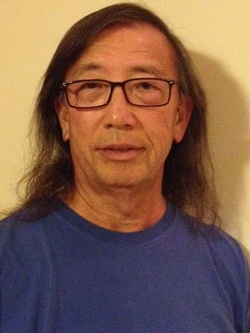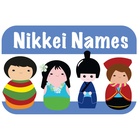Writing assignment: an essay about Nikkei Names. A cinch, until I asked myself the question, “What is a Nikkei name?” As I understand it, Nikkei is the term we are using these days for Japanese in the diaspora? If so, should I write about Japanese names? That would be a short essay, unless I made a list of all the Japanese names I know—actually, it would still be a short essay.
So, if not “Japanese” names, then I’ll write about names people have who are of Japanese ancestry. Easy enough, except that I know little about names. I can assume, however, that most of us were named with some degree of deliberation and forethought about what the name meant, the personality behind the name, and how it might shape the young person who is being named. So, I surveyed my relatives, those for whom I had email addresses—this is the twenty-first century.
Let me begin with my own name. It is of Welsh origins and you will find that it usually means grey or brown. So why would this little Japanese boy, born near the beginning of the baby-boom years, in Hawaii, be named Lloyd? “Mom, why was I named Lloyd?” It turns out that my mother was hoping that I would be a baby girl and had not thought of any names for a boy. (I am the youngest of four and the eldest is my sister, so my mother wanted “bookend” girls around two boys.) Surprise!
Ever the resourceful one, my mother asked her brother, who was either a teacher or principal when I was born, for some assistance. Being an avid golfer, he volunteered that my mother should name me after his then-favorite golfer, Lloyd Mangrum, whose only major win was the 1946 U.S. Open. He was on Ryder Cup teams, but this is the guy for whom I was named. Whoop-t-do, I was named after someone who was marginal at best. So how am I to be inspired? How would I be shaped by this Welsh name used by a less-than-stellar golfer?
In my life, I’ve known only two other Lloyds who were of Japanese ancestry. Sadly, one died as a boy but the other is one of my heroes. I really have not met any others that I can remember, and I would remember because I find the name rather unusual. When younger, I often thought of the myriad of names I could have had, not that I disliked my name. I imagine that most of us go through this phase of maturity—puberty. And for some reason, people had a difficult time with Lloyd. My Issei grandparents could not pronounce it and many, many people could not spell it, even when I helped them with, “You know, Lloyds of London?” Today I might say, “You know, like the singer.” I had a cousin who pronounced the double-L as in Spanish, so he called me “Yoid.”
What troubled me about my name was how it sounded when paired with my last name. Roll those around your mouth a few times and see how it tastes. I’ve never really disliked my name, just the combination of the two. When younger, I tried to pair Kajikawa with many other non-Japanese names to see if I could find a good-sounding combination. Truth is, most non-Japanese names sound “strange” when paired with a Japanese name, but, my Nisei parents, as with most of their generation, embraced the idea of being American in a most fierce way. Hence, some of my relatives and siblings, in no particular order—Susan, Randall, Rodney, Calvin, Jean, Carolyn, Glenn, Mona, Dennis (after Dennis Day), Vernon (how many do you know?), June, Reynolds, Charles, Dorothy, Sharon, Barbara (Bobbie), Dexter, David, Donna, Debbie, Dean (the last five Ds are from one family), Marvin, Lynn, Irving, Blaine, Richard, Evelyn, Marian, and Elsie.
I’m no expert on names but it is clear to me that names are generational in the sense that each generation names their offspring in slightly different ways depending on the cultural bent of the time. All of the aforementioned names came from Issei and Nisei parents and from parents who were born in, or immigrated to, Hawaii. Contrast them to names of relatives whose parents were Sansei or Yonsei—Loren, Gavin, Brent, Alisa, Justin, Reid, Shannon, Miranda, Evan, Stephanie, Sandra, Aaron, Jason, Janelle, Ashley, Bethley, Chelsey, Cameron, Kaylie, Ryan, Leanna, Melissa, Natalie, and Lindsey.
Is it just me or is there a “difference” between the two lists of names?
My son, the “hip-hop professor” at the University of Oregon, has two children—Maya and Kenzo. My claim regarding “cultural bent” still applies as he and his wife, Mika, wanted names that were easily pronounced by Japanese relatives and English speakers alike. Being the ever-proud father and grandfather, I believe they did a great job.
However, to this day, most children of Japanese ancestry are given non-Japanese names and, if they are lucky, are given a Japanese name as a “middle” name. For me, that would be Takami. Remember that I said my mother was hoping that I would be a girl so my sister would not be the only girl in the family? Hence, Takami—“high beauty”—whose kanji, I’ve been told can best be ascribed to a female, but I’m not certain. I just know that my mother wanted me named “high beauty.” “Grey High-beauty Kajikawa” does have a certain ring to it. As an aside, my Hawaii cousins reported that my paternal grandfather selected the names of the grandchildren until he died, which was before I was born. I wonder what he would have named me.
So what’s in a Nikkei name? Does it matter that one is named by a relative instead of one’s parents? Does it make a difference if one’s parents wanted to be more American than others? Does it matter if parents wanted their child to be one gender or another?
I honestly don’t know the answers to these questions. I’m almost certain that the answers don’t matter, and the questions are somewhat rhetorical. In communication with my relatives about the issue, one thing is very clear, regardless of how or why anyone of us was named, none of us dislike the names we were given. We may be perplexed at being given the name we have, but none of my relatives, including me, wishes they had a different name, or hated their parents for naming them as they did. I find this fact to be most uplifting in that all of the parents did a decent job in naming their children, no matter the language or culture.
© 2014 Lloyd Kajikawa




